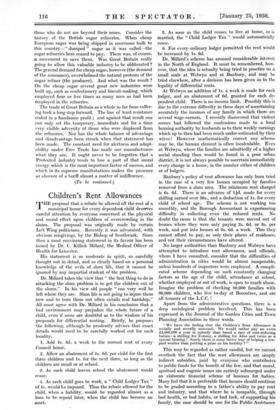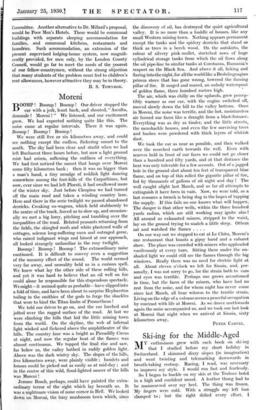Children's Rent Allowances
THE proposal that a rebate be allowed off the rent of a municipal house for every dependent child deserves careful attention by everyone concerned at the physical and moral effect upon children of overcrowding in the slums. The proposal was originally , made by certain Left Wing politicians. Recently it was advocated, with obvious misgivings, by the Bishop of Southwark. Since then a most convincing statement in its favour has been issued by Dr. C. Killick Millard, the Medical Officer of Health for Leicester.
His statement is so moderate in spirit, so carefully thought out in detail, and so clearly based on a personal knowledge of the evils of slum life, that it cannot be ignored by any impartial student of the problem.
Dr. Millard takes the view that " the first thing to do in attacking the slum problem is to get the children out of the slums." In his view old people " can very well be left where they are. Slum life is not going to injure them now and to turn them out often entails real hardship." All must agree with Dr. Millard in his conclusion that a bad environment may prejudice the whole future of a child, even if some are doubtful as to the wisdom of his proposals for differential renting. Briefly, he proposes the following, although he prudently advises that exact details would need to be carefully worked out for each locality.
I. Add ls. 6d. a week to the normal rent of every Council house.
2. Allow an abatement of ls. 6d. per child for the first three children and ls. for the next three, so long as the children are small or at school.
8. As each child leaves school the abatement would cease.
4. As each child goes to work, a " Child Lodger Tax " of Is. would be imposed. Thus the rebate allowed for the child, when a liability, would be regarded almost as a loan to be repaid later, when the child has become an asset. 5. As soon as the child ceases to live at home, or is married, the " Child Lodger Tax " would automatically cease.
6. For every ordinary lodger permitted the rent would be increased by ls. 6d. Dr. Minted's scheme has aroused considerable interest in the North of England. It must be remembered, how- ever, that the idea is actually being tried in practice on a small scale at Welwyn and at Banbury, and may be tried elsewhere, after a decision has been given its to the legality of differential rents.
At Welwyn an addition of ls. a week is made for each lodger, and an abatement of 6d. granted for each de- pendent child. There is no income limit. Possibly this is due to the extreme difficulty in these days of ascertaining accurately the incomes of any family in which there are several wage-earners. I recently discovered that violent scenes had followed the confessions made to a local housing authority by husbands as to their weekly earnings which up to then had been much under-estimated by their wives ! However mathematically correct any scheme may be, the human element is often incalculable. Even at Welwyn, where the families are admittedly of a higher social standing than would be found in a poor urban district, it is not always possible to ascertain immediately every change in a house, in the number either of children or of lodgers.
Banbury's policy of rent allowance has only been tried in the case of a very few houses occupied by families removed from a slum area. The minimum rent charged is 6s. 6d. There is an advance of I id. made for every shilling earned over 30s., and a deduction of Is. for every child of school age. The scheme is not working too smoothly, and the Borough Accountant is experiencing difficulty in collecting even the reduced rents. No doubt the cause is that the tenants were moved out of houses where they were only paying 2s. 6d. or 3s. per week, and put into houses at 6s. 6d. a week. This they cannot afford to pay, as . only their _places _of residence, and not their circumstances have altered.
No larger authorities than Banbury and Welwyn have attempted to introduce rent • allowances, and officials, whom I have consulted, consider that the difficulties of administration in cities would be almost insuperable, unless hundreds of inspectors were employed. A compli- cated scheme depending on such constantly changing factors as the age of the child, attendance at school, whether employed or out of work, is open to much abuse. Imagine the problem of checking 80,000 families, with 80,000 children, who live to-day at Becontree, and are all tenants of the L.C.C. !
Apart from the administrative questions, there is a deep sociological problem involved. This has been expressed in the Journal of the Garden Cities and. Town Planning Association in these words.
" We have the feeling that the Children's Rent Allowance is socially and morally unsound. We would rather pay an extra £3,000,000 a year in subsidy than breed a race of rent-reducing babies—a shilling for Tommy, a shilling for Alice and twins as a special blessing ! Surely there is some better way of helping a low- paid worker than putting a prize on his fertility ? "
This may be regarded as rather candid, but we cannot overlook the fact that the rent allowances are simply indirect subsidies, paid by everyone who contributes to public funds for the benefit of the few, and that moral, spiritual and eugenic issues are entirely submerged under an elaborate financial scheme of bonuses for babies. Many feel that it is preferable that houses should continue to be graded according to a father's ability to pay rent and industry, and that where he is incapable, through bad health, or bad habits, or bad luck, of supporting his family, the case should be one for the Public Assistance Committee. Another alternative to Dr. Millard's proposal, would be Poor. Men's Hotels. These would be communal buildings with separate sleeping accommodation for families, and communal kitchens, restaurants and laundries. Such accommodation, an extension of the present supervised lodging-house system, now magnifi- cently provided, for men only, by the London County Council, would go far to meet the needs of the poorest of our fellow-countrymen, without the strong objection that many students of the problem must feel to children's rent allowances, however attractive they may be in theory.
B. S. TOWNROE.







































 Previous page
Previous page